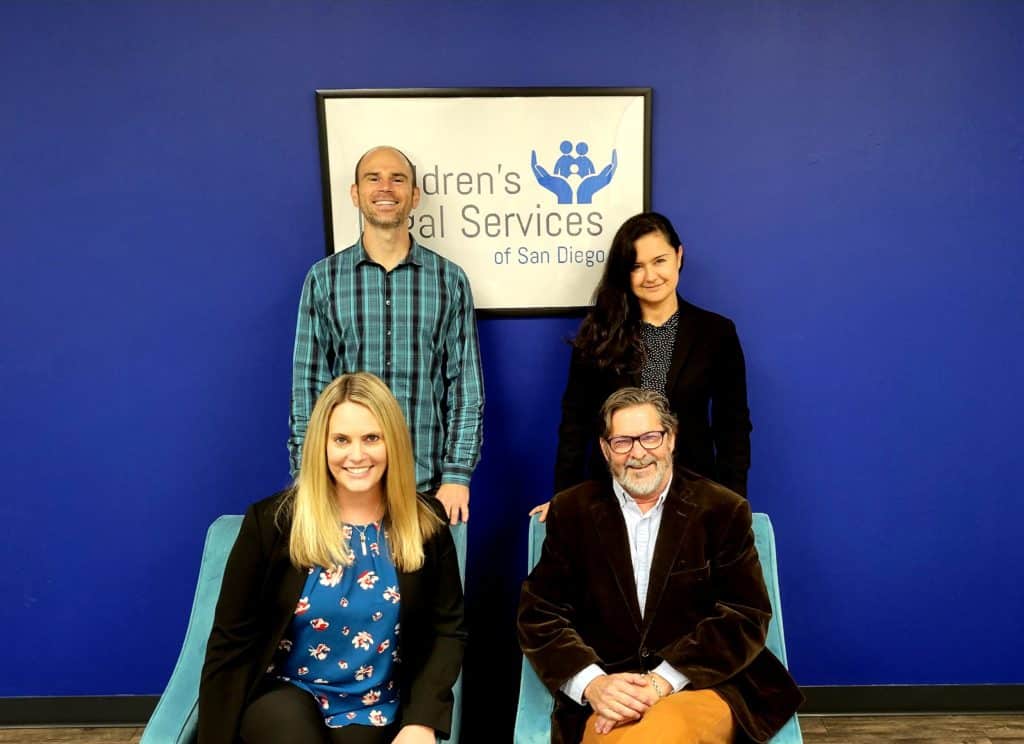
Throughout a child’s case, Voices for Children staff and volunteers work alongside a number of dedicated professionals. From social workers to attorneys to therapists, each person has a unique role and expertise to bring about the best outcomes for youth.
One such position is that of a minor’s attorney — a professional who protects the rights of children in foster care by representing them in court. We interviewed three attorneys who specialize in defending a specific group of youth: Non Minor Dependents.
Non Minor Dependents, referred to as nonminors or NMDs, are youth between the ages of 18 and 21 who choose to stay in California’s extended foster care (EFC) program. NMD attorneys are well-versed in the specific needs of children in extended foster care. In San Diego County, Children’s Legal Services of San Diego (CLSSD), provides this type of legal advocacy for NMDs.
Managing attorney at CLSSD, Steve Wedel, shared, “I love this area of law […] It’s exceptionally easy to remain motivated when you represent minors, and provide them with empowerment by allowing them a voice in court.”
“As adults, NMD clients themselves decide what is in their best interests. We do, of course, counsel and give options […] The goal during extended foster care is to support our clients as adults and help them transition to being an adult who will be on their own once they turn 21,” he added.
NMDs, like other young adults, are focused on finding a foothold through job security, housing, financial literacy, and other vital independent skills. Sadly, the statistics show these youth are extremely vulnerable. In California:
- Only 59% of 12th graders in foster care graduated high school with their cohort in 2018, compared to 83% of all students.
- Just 3% of former foster youth earn a college degree.
- Nearly 50% of individuals are unemployed within four years of exiting foster care; more than 25% are incarcerated; and 20% experience homelessness.
NMD attorneys, along with Court Appointed Special Advocates (CASAs) and the other professionals on a youth’s case, focus on these issues when advocating for NMDs and provide valuable guidance as they transition into adulthood.
“These youth have a wide array of needs such as housing, job resources, referrals to outside counsel (for child support and custody, criminal law, consumer law, et cetera) that don’t present much with minors,” shared NMD and dual lead attorney Caitlin Zaback. “One of the most rewarding parts of my job currently is to watch clients age out successfully. That looks different for different people, but usually involves stability and having a strong support system in place. I have known some of my clients who are aging out this year for over 10 years!”
To ensure that young adults have every opportunity to achieve stability and independence, the court and various professionals place a special focus on this population. Justin Shagrin, staff attorney at CLSSD, shared, “We use a centralized courtroom where only NMD cases are heard. This allows the court to give each NMD the attention that they truly deserve. Our representation includes conversations about proper resources, developing independent skills, and pursuing employment, education, and programs that help secure those goals. The Transitional Independent Living Plan is a vital document developed collaboratively that helps steer the ship towards success after dependency jurisdiction ends.”
Building a solid foundation for NMDs is a collaborative effort. “I frequently collaborate with CASAs through discussions about clients and cases,” said Caitlin. “[VFC Senior Advocacy Supervisor] Jane Wehrmeister is always a participant in my quarterly meetings. I think Children’s Legal Services and [Voices for Children] have a very collaborative and helpful relationship, particularly when it comes to supporting our NMDs!”
Organizations like CLSSD and the dedicated individuals serving our children are making a lifelong impact on this vulnerable population. We are so grateful to the compassionate attorneys who have dedicated their careers to serving our community’s youth.
To learn more about Children’s Legal Services of San Diego, visit https://www.clssandiego.org/.

 CASA of the Month – November 2021
CASA of the Month – November 2021